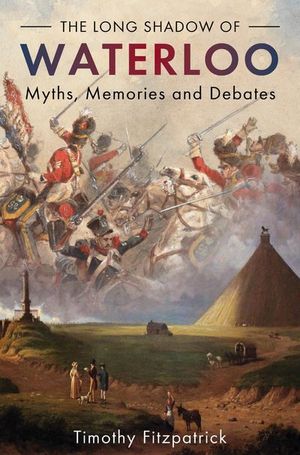The Long Shadow of Waterloo
Published by Casemate Publishers
“[A] concise but authoritative narrative of the last action of the Napoleonic Wars” and its influence on French, British, German, and U.S. cultures (Military History Matters).
The Battle of Waterloo ended a century of war between France and Great Britain and became a key part of their national identity, serving their political needs as the battle was refought throughout the 19th century in politics, books and art to create the myth of Waterloo. For Great Britain, Waterloo became a symbol of British hegemony while the multinational contribution to the battle was downplayed and for France it was remembered as a military disaster.
Through looking at the battle’s significance in history, an insight is gained into how cultural myths and legends about a battle are made. Wellington and Napoleon both tried to shape the memory of the battle to their advantage. Wellington propagated the myth that the British won despite being outnumbered by a huge French army, while Napoleon chose to blame his subordinates for the loss, in particular Emmanuel de Grouchy.
This book covers the battle’s influence on figures such as Jomini and Clausewitz, military theorists who wanted to find the objective truth of Waterloo and use it as a guide for future wars, as well as Victor Hugo (and Les Miserables) who challenged the myths of battle to transform it into a win for France from which the Republic would emerge. The way Waterloo was used for entertainment is also explored, as battlefield tourists came from all over the world to vicariously experience the legendary battle through visualizations such as the traveling panoramas in England and poetry of Sir Walter Scott.
The Battle of Waterloo ended a century of war between France and Great Britain and became a key part of their national identity, serving their political needs as the battle was refought throughout the 19th century in politics, books and art to create the myth of Waterloo. For Great Britain, Waterloo became a symbol of British hegemony while the multinational contribution to the battle was downplayed and for France it was remembered as a military disaster.
Through looking at the battle’s significance in history, an insight is gained into how cultural myths and legends about a battle are made. Wellington and Napoleon both tried to shape the memory of the battle to their advantage. Wellington propagated the myth that the British won despite being outnumbered by a huge French army, while Napoleon chose to blame his subordinates for the loss, in particular Emmanuel de Grouchy.
This book covers the battle’s influence on figures such as Jomini and Clausewitz, military theorists who wanted to find the objective truth of Waterloo and use it as a guide for future wars, as well as Victor Hugo (and Les Miserables) who challenged the myths of battle to transform it into a win for France from which the Republic would emerge. The way Waterloo was used for entertainment is also explored, as battlefield tourists came from all over the world to vicariously experience the legendary battle through visualizations such as the traveling panoramas in England and poetry of Sir Walter Scott.
BUY NOW FROM
COMMUNITY REVIEWS
